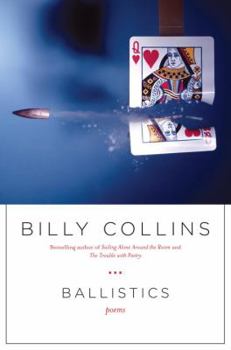Ballistics: Poems
Select Format
Select Condition 
Book Overview
In this moving and playful collection, Billy Collins touches on an array of subjects--love, death, solitude, youth, and aging--delving deeper than ever before into the intricate folds of life. This description may be from another edition of this product.
Format:Hardcover
Language:English
ISBN:1400064910
ISBN13:9781400064915
Release Date:September 2008
Publisher:Random House (NY)
Length:112 Pages
Weight:0.64 lbs.
Dimensions:0.9" x 5.7" x 8.3"
Related Subjects
PoetryCustomer Reviews
5 ratings
Billy Collins poetry
Published by Thriftbooks.com User , 14 years ago
This latest collection of Collins poetry is just what one needs to see this world with fresh eyes.
Typically Collins
Published by Thriftbooks.com User , 15 years ago
Ballistics is another supreme example by Billy Collins on how to be a poet that everyone can enjoy. He doesn't play the typical "poem games" that most University professors seem to think must be played in order to be recognized as a poet. I really enjoy all of Collins works and am able to relate to his wittiness and humor. I am intrigued by his sense of reality on the subject of death and his disgust in the fact that when it comes knocking it sometimes seems to show up at what would appear to be the wrong door in an unfair manner. Ballistics is worthy of the time spent and the visions it creates.
Billy Collins on Target as Always
Published by Thriftbooks.com User , 15 years ago
Billy Collins' latest collection of poems "Ballistics" is up to his usual standard of excellence. Collins turns ordinary things into little gems of perfection. He was America's port laureate for two terms at which time he was very active in advancing an interest in poetry, especially with children. Billy Collins is an American hero.
Deep poetry
Published by Thriftbooks.com User , 15 years ago
Collins poetry is always deep, sophisticated and insightful. I particularly love "The Four-Moon Planet," "Vermont, Early November," and "The Future." Collins reflects in this manner on his solitude: "All I do these drawn-out days is sit in my kitchen at Pheasant Ridge where there are no pheasants to be seen and, last time I looked, no ridge." This is what he writes about love: It turns everything into a symbol like a storm that breaks loose in the final chapter of a long novel. And it may add sparkle to a morning, or deepen a night when the bed is ringed with fire. This is a great book that explores small and great subjects and makes them memorable. Once again, Collins have succeeded in expanding and breaking new ground. He remains a brilliant and insightful poet.
Poetry That Begins In Delight and Ends in Wisdom
Published by Thriftbooks.com User , 16 years ago
When I recently heard Billy Collins read several of the poems from this new collection, he was compared, both in the printed material and by the person who introduced him, to Robert Frost in that both writers have the "rare combination of critical acclaim and broad popular appeal," a dubious comparison at best since I can think of six or eight other contemporary poets who would fall into that category as well. I certainly am not suggesting that Mr. Collins, Poet Laureate of the United States from 2001 to 2003, is not a fine poet; that he is. He just sounds nothing like Robert Frost nor any other poet for that matter. His poetry does, however, fit Frost's definition of poetry as beginning in delight and ending in wisdom. I was reminded once again that except in the rarest cases that no one reads poetry as well its author and that poetry should always be read aloud. Mr. Collins writes with charm and humor about the most ordinary of subjects. "This Little Piggy Went to the Market" is all about playing with children. Animals float in bathtubs in "Bathtub Families." And in the poem "Ballistics" for which this volume is named, the poet imagines that in the high-speed photograph of a bullet piercing a book, that the "executed book/was a recent collection of poems written by someone of whom I was not fond." In addition to these poems that will make you smile, often written with tongue in cheek, many of Mr. Collins' poems would fit his description of poetry as giving form to misery while others fall somewhere in between these two extremes. I would nominate the thoughtful "An Old Man Eating Alone in a Chinese Restaurant" as one of those where Collins is glad that he resisted the temptation as a young poet to write about a lonely old man eating in a restaurant. Now he finds the food delicious, the light "which falls through the big windows this time of day italicizing everything it touches --" and his enjoyment of reading a "book --Jose Saramago's BLINDNESS as it turns out --" and the smiling waitress (the poet says he learned the proper use of the dash from Emily Dickinson). Mr. Collins can say volumes in few carefully chosen words as in the poem entitled "Divorce." Once, two spoons in a bed, now tined forks across a granite table and the knives they have hired. Then there is the darker poem "A Dog on His Master" where the dog hopes that his master understands that he in all probability will outlive his dog. Finally my favorite poem of so very many is "On the Death of a Next-door Neighbor" which begins with the following lines: So much younger and with a tall, young son in the house above ours on a hill, it seemed that death had blundered once again. Was it poor directions, the blurring rain, or the too-small numbers on the mailbox that sent his dark car up the wrong winding driveway? Surely, it was me he was looking for -- If these lines do not put chills on your spine, you have to be like the next-door neighbor. A wondrously





